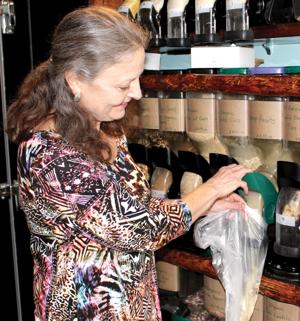Source: tahlequahdailypress.com

Deana Franke, owner of Oasis Health Foods, said she uses hemp
hearts in a lot of her cooking to add nutritional value.
The debate over marijuana and its prohibition has been an ongoing issue in American society, but for many advocates, the quest to legalize industrial hemp is just as important.
A movement called “Green the Vote” has been among the driving forces in educating Oklahomans on medical marijuana and its benefits, and has even drafted a petition for people to sign and support their cause.
The petition is an initiative to change the Oklahoma Constitution, allowing marijuana to be classified as an herbal drug regulated by the Oklahoma State Department of Health. If passed, it would permit the use of marijuana under the recommendation of a board-certified physician.
Tax proceeds from sales of marijuana would be allocated first to fund regulatory processes for the medical marijuana. Excess tax income from sales would then be divided, with 75 percent going to the Oklahoma State Department of Education and 25 percent to the OSDH.
Along with revamping laws, the petition aims to change the classification of marijuana containing less than .03 percent THC as industrial hemp, allowing for the growth and commerce of the plant.
Hemp is a commonly used term for industrial varieties of the cannabis plant that grow very tall. Hemp is a variant of the cannabis plant that has negligible amounts of the psychoactive ingredients found in medical marijuana: tetrahydrocannabinol, or THC, cannabidiol, or CBD, and other cannabinoids.
Hemp is refined and can be used in a number of products, including foods, oil, wax, resin, rope, cloth, paper, fuel and other useful products. While hemp can be imported and sold in the states, it was made illegal to grow in 1970 by the Controlled Substances Act under the Nixon administration.
Rhiannon Moore, a volunteer with Green the Vote, has been an advocate for hemp and medical marijuana for more than 15 years. She said hemp has numerous benefits, and voters should take time to educate themselves on the subject.
“People don’t need to be scared to educate themselves on medical marijuana and hemp,” Moore said. “It’s definitely a sensitive subject, but people need to open up and learn a little about it. Industrial hemp can make clothes that are 10 times stronger than cotton, it can make brick materials for construction, and we wouldn’t be cutting down as many trees because it can be used in place of paper products.”
She added that hemp oils can have nutritional benefits that regular cooking oils don’t have.
“Just about anything, cosmetic hemp can also be implemented into,” she said.
Many people equate hemp with marijuana, but Moore says that’s an inaccurate assumption.
“The THC potency is a lot less in industrial hemp,” Moore said. “You can’t get high from smoking hemp.”
Bob Saeger, an advocate for marijuana and hemp for 30 years, said it’s an issue that has been on the back burner for too long.
“When people recognize the entire value of the plant, they’ll realize we need it,” Saeger said. “It’s a very efficient plant, and it makes use of photosynthesis better than most other plants. In my opinion, it should be like alfalfa or hay; it’s just a plant, and let’s use it.”
Saeger believes society has been brainwashed by the so-called Nixon/Reagan “War on Marijuana.”
“There’s this whole culture that we’re trying to overcome,” he said. “A lot of my generation got bamboozled into a convenient way for life without much regard for democracy. If you look at why Prohibition was brought about in 1937, it makes Enron look like fiddlesticks.”
Saeger said hemp farmers and those who advocate the plant want to find ways to incorporate it into daily life in a way that benefits both the environment and the economy.
“If you favor nuclear power or prohibition, then you are no friend of the earth,” Saeger said. “I think we are in a perilous situation. People can be thieves, and their character can be no good at all, but you can’t blame that on a plant. Some people that are innovators, farmers or successful growers have been put in jail.”
He thinks the only restrictions on hemp should be on how it is grown, to ensure quality for consumers.
“I don’t understand why more people aren’t outspoken against a society that won’t talk about the benefits of it. If you want climate change and you want to end the destruction of the environment, then you have to stop cutting down the forests at the rate we are,” Saeger said. “Hemp is a superior plant for biofuels, as well as for paper.”
It also has a good root system, so its helps hold the soil in place, he said.
“So in some of these marginal lands, hemp can help with erosion and can help conserve the soil,” he said. “The good thing about hemp, too, is it just grows like a weed, and some strains will grow very fast. What bothers me is the blatant disregard of this information and the benefit it could have to future generations.”
Oasis Health Foods offers a number of hemp products, and owner Deana Franke said she herself uses hemp seeds, also known as hemp hearts, in a lot of her cooking. She said hemp seeds are a good source of protein, omega-3 and fiber.
“If I make a birthday cake, there’s going to be hemp hearts in it,” Franke said. “That way, you aren’t just eating negative calories; you’re actually getting some value out of what you’re eating. They aren’t strong, so you can really put them in anything without affecting the taste.”
No comments:
Post a Comment